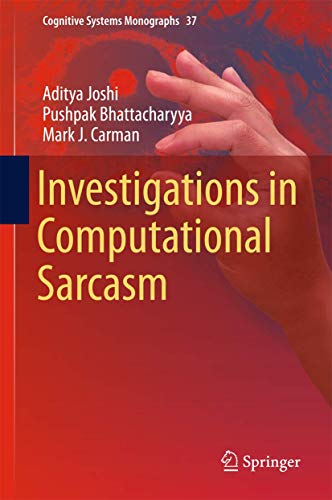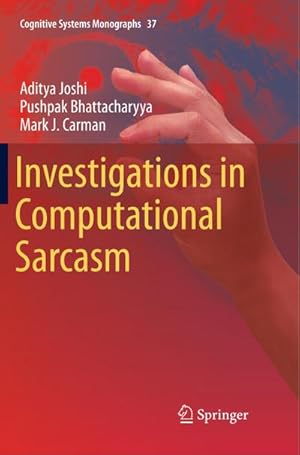investigations computational sarcasm von joshi aditya (6 Ergebnisse)
FeedbackSuchfilter
Produktart
- Alle Product Types
- Bücher (6)
- Magazine & Zeitschriften (Keine weiteren Ergebnisse entsprechen dieser Verfeinerung)
- Comics (Keine weiteren Ergebnisse entsprechen dieser Verfeinerung)
- Noten (Keine weiteren Ergebnisse entsprechen dieser Verfeinerung)
- Kunst, Grafik & Poster (Keine weiteren Ergebnisse entsprechen dieser Verfeinerung)
- Fotografien (Keine weiteren Ergebnisse entsprechen dieser Verfeinerung)
- Karten (Keine weiteren Ergebnisse entsprechen dieser Verfeinerung)
- Manuskripte & Papierantiquitäten (Keine weiteren Ergebnisse entsprechen dieser Verfeinerung)
Zustand
Einband
Weitere Eigenschaften
- Erstausgabe (Keine weiteren Ergebnisse entsprechen dieser Verfeinerung)
- Signiert (Keine weiteren Ergebnisse entsprechen dieser Verfeinerung)
- Schutzumschlag (Keine weiteren Ergebnisse entsprechen dieser Verfeinerung)
- Angebotsfoto (4)
Sprache (1)
Gratisversand
Land des Verkäufers
Verkäuferbewertung
-
Investigations in Computational Sarcasm
Verlag: Springer Nature Singapore, 2018
ISBN 10: 9811083959 ISBN 13: 9789811083952
Sprache: Englisch
Anbieter: Buchpark, Trebbin, Deutschland
EUR 14,39
Währung umrechnenKostenlos für den Versand innerhalb von/der DeutschlandAnzahl: 2 verfügbar
In den WarenkorbZustand: Sehr gut. Zustand: Sehr gut | Sprache: Englisch | Produktart: Bücher.
-
Investigations in Computational Sarcasm
Verlag: Springer Nature Singapore, Springer Nature Singapore Jan 2019, 2019
ISBN 10: 9811341397 ISBN 13: 9789811341397
Sprache: Englisch
Anbieter: buchversandmimpf2000, Emtmannsberg, BAYE, Deutschland
EUR 106,99
Währung umrechnenKostenlos für den Versand innerhalb von/der DeutschlandAnzahl: 2 verfügbar
In den WarenkorbTaschenbuch. Zustand: Neu. Neuware -This book describes the authors¿ investigations of computational sarcasm based on the notion of incongruity. In addition, it provides a holistic view of past work in computational sarcasm and the challenges and opportunities that lie ahead. Sarcastic text is a peculiar form of sentiment expression and computational sarcasm refers to computational techniques that process sarcastic text. To first understand the phenomenon of sarcasm, three studies are conducted: (a) how is sarcasm annotation impacted when done by non-native annotators (b) How is sarcasm annotation impacted when the task is to distinguish between sarcasm and irony And (c) can targets of sarcasm be identified by humans and computers. Following these studies, the book proposes approaches for two research problems: sarcasm detection and sarcasm generation. To detect sarcasm, incongruity is captured in two ways: ¿intra-textual incongruity¿ where the authors look at incongruity within the text to be classified (i.e., target text) and ¿context incongruity¿ where the authors incorporate information outside the target text. These approaches use machine-learning techniques such as classifiers, topic models, sequence labelling, and word embeddings. These approaches operate at multiple levels: (a) sentiment incongruity (based on sentiment mixtures), (b) semantic incongruity (based on word embedding distance), (c) language model incongruity (based on unexpected language model), (d) author¿s historical context (based on past text by the author), and (e) conversational context (based on cues from the conversation). In the second part of the book, the authors present the first known technique for sarcasm generation, which uses a template-based approach to generate a sarcastic response to user input. This book will prove to be a valuable resource for researchers working on sentiment analysis, especially as applied to automation in social media.Springer Verlag GmbH, Tiergartenstr. 17, 69121 Heidelberg 156 pp. Englisch.
-
Investigations in Computational Sarcasm
Verlag: Springer Nature Singapore, Springer Nature Singapore Apr 2018, 2018
ISBN 10: 9811083959 ISBN 13: 9789811083952
Sprache: Englisch
Anbieter: buchversandmimpf2000, Emtmannsberg, BAYE, Deutschland
EUR 106,99
Währung umrechnenKostenlos für den Versand innerhalb von/der DeutschlandAnzahl: 2 verfügbar
In den WarenkorbBuch. Zustand: Neu. Neuware -This book describes the authors¿ investigations of computational sarcasm based on the notion of incongruity. In addition, it provides a holistic view of past work in computational sarcasm and the challenges and opportunities that lie ahead. Sarcastic text is a peculiar form of sentiment expression and computational sarcasm refers to computational techniques that process sarcastic text. To first understand the phenomenon of sarcasm, three studies are conducted: (a) how is sarcasm annotation impacted when done by non-native annotators (b) How is sarcasm annotation impacted when the task is to distinguish between sarcasm and irony And (c) can targets of sarcasm be identified by humans and computers. Following these studies, the book proposes approaches for two research problems: sarcasm detection and sarcasm generation. To detect sarcasm, incongruity is captured in two ways: ¿intra-textual incongruity¿ where the authors look at incongruity within the text to be classified (i.e., target text) and ¿context incongruity¿ where the authors incorporate information outside the target text. These approaches use machine-learning techniques such as classifiers, topic models, sequence labelling, and word embeddings. These approaches operate at multiple levels: (a) sentiment incongruity (based on sentiment mixtures), (b) semantic incongruity (based on word embedding distance), (c) language model incongruity (based on unexpected language model), (d) author¿s historical context (based on past text by the author), and (e) conversational context (based on cues from the conversation). In the second part of the book, the authors present the first known technique for sarcasm generation, which uses a template-based approach to generate a sarcastic response to user input. This book will prove to be a valuable resource for researchers working on sentiment analysis, especially as applied to automation in social media.Springer Verlag GmbH, Tiergartenstr. 17, 69121 Heidelberg 156 pp. Englisch.
-
Investigations in Computational Sarcasm
Verlag: Springer Nature Singapore, Springer Nature Singapore, 2018
ISBN 10: 9811083959 ISBN 13: 9789811083952
Sprache: Englisch
Anbieter: AHA-BUCH GmbH, Einbeck, Deutschland
EUR 109,94
Währung umrechnenKostenlos für den Versand innerhalb von/der DeutschlandAnzahl: 1 verfügbar
In den WarenkorbBuch. Zustand: Neu. Druck auf Anfrage Neuware - Printed after ordering - This book describes the authors' investigations of computational sarcasm based on the notion of incongruity. In addition, it provides a holistic view of past work in computational sarcasm and the challenges and opportunities that lie ahead. Sarcastic text is a peculiar form of sentiment expression and computational sarcasm refers to computational techniques that process sarcastic text. To first understand the phenomenon of sarcasm, three studies are conducted: (a) how is sarcasm annotation impacted when done by non-native annotators (b) How is sarcasm annotation impacted when the task is to distinguish between sarcasm and irony And (c) can targets of sarcasm be identified by humans and computers. Following these studies, the book proposes approaches for two research problems: sarcasm detection and sarcasm generation. To detect sarcasm, incongruity is captured in two ways: 'intra-textual incongruity' where the authors look at incongruity within the text to be classified (i.e., target text) and 'context incongruity' where the authors incorporate information outside the target text. These approaches use machine-learning techniques such as classifiers, topic models, sequence labelling, and word embeddings. These approaches operate at multiple levels: (a) sentiment incongruity (based on sentiment mixtures), (b) semantic incongruity (based on word embedding distance), (c) language model incongruity (based on unexpected language model), (d) author's historical context (based on past text by the author), and (e) conversational context (based on cues from the conversation). In the second part of the book, the authors present the first known technique for sarcasm generation, which uses a template-based approach to generate a sarcastic response to user input. This book will prove to be a valuable resource for researchers working on sentiment analysis, especially as applied to automation in social media.
-
Investigations in Computational Sarcasm
Verlag: Springer Nature Singapore, Springer Nature Singapore, 2019
ISBN 10: 9811341397 ISBN 13: 9789811341397
Sprache: Englisch
Anbieter: AHA-BUCH GmbH, Einbeck, Deutschland
EUR 109,94
Währung umrechnenKostenlos für den Versand innerhalb von/der DeutschlandAnzahl: 1 verfügbar
In den WarenkorbTaschenbuch. Zustand: Neu. Druck auf Anfrage Neuware - Printed after ordering - This book describes the authors' investigations of computational sarcasm based on the notion of incongruity. In addition, it provides a holistic view of past work in computational sarcasm and the challenges and opportunities that lie ahead. Sarcastic text is a peculiar form of sentiment expression and computational sarcasm refers to computational techniques that process sarcastic text. To first understand the phenomenon of sarcasm, three studies are conducted: (a) how is sarcasm annotation impacted when done by non-native annotators (b) How is sarcasm annotation impacted when the task is to distinguish between sarcasm and irony And (c) can targets of sarcasm be identified by humans and computers. Following these studies, the book proposes approaches for two research problems: sarcasm detection and sarcasm generation. To detect sarcasm, incongruity is captured in two ways: 'intra-textual incongruity' where the authors look at incongruity within the text to be classified (i.e., target text) and 'context incongruity' where the authors incorporate information outside the target text. These approaches use machine-learning techniques such as classifiers, topic models, sequence labelling, and word embeddings. These approaches operate at multiple levels: (a) sentiment incongruity (based on sentiment mixtures), (b) semantic incongruity (based on word embedding distance), (c) language model incongruity (based on unexpected language model), (d) author's historical context (based on past text by the author), and (e) conversational context (based on cues from the conversation). In the second part of the book, the authors present the first known technique for sarcasm generation, which uses a template-based approach to generate a sarcastic response to user input. This book will prove to be a valuable resource for researchers working on sentiment analysis, especially as applied to automation in social media.
-
Investigations in Computational Sarcasm
Verlag: Springer-Verlag New York Inc, 2019
ISBN 10: 9811341397 ISBN 13: 9789811341397
Sprache: Englisch
Anbieter: Revaluation Books, Exeter, Vereinigtes Königreich
EUR 179,65
Währung umrechnenEUR 11,53 für den Versand von Vereinigtes Königreich nach DeutschlandAnzahl: 1 verfügbar
In den WarenkorbPaperback. Zustand: Brand New. reprint edition. 156 pages. 9.25x6.10x0.36 inches. In Stock.







